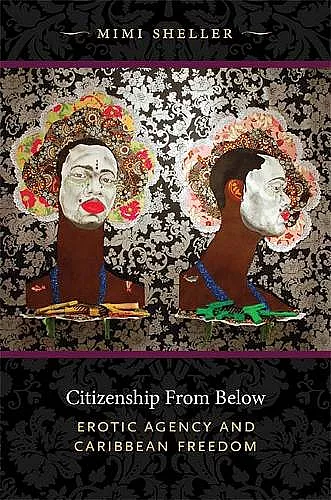Citizenship from Below
Erotic Agency and Caribbean Freedom
Format:Paperback
Publisher:Duke University Press
Published:7th May '12
Currently unavailable, and unfortunately no date known when it will be back

This comparative feminist work starts with a substantial historical account of the different ways that freedom, race and gender were intertwined in Jamaica and Haiti after the end of slavery. Newly free men and women were rebound into a racialized class order with acceptable and unacceptable forms of masculinity and femininity - what the author calls embodied freedom. Sheller traces these histories of racialized and sexualized forms of freedom to the present, where, using tools from feminist geography, she examines the contemporary gendered spaces of citizenship, travel, and popular culture across the Caribbean.
A comparative feminist work that starts with a substantial historical account of the different ways that freedom, race and gender were intertwined in Jamaica and Haiti after the end of slavery. It examines the contemporary gendered spaces of citizenship, travel, and popular culture across the Caribbean.Citizenship from Below boldly revises the history of the struggles for freedom by emancipated peoples in post-slavery Jamaica, post-independence Haiti, and the wider Caribbean by focusing on the interplay between the state, the body, race, and sexuality. Mimi Sheller offers a new theory of "citizenship from below" to describe the contest between "proper" spaces of legitimate high politics and the disavowed politics of lived embodiment. While acknowledging the internal contradictions and damaging exclusions of subaltern self-empowerment, Sheller roots out from beneath the historical archive traces of a deeper freedom, one expressed through bodily performances, familial relationships, cultivation of the land, and sacred worship.
Attending to the hidden linkages among intimate realms and the public sphere, Sheller explores specific struggles for freedom, including women's political activism in Jamaica; the role of discourses of "manhood" in the making of free subjects, soldiers, and citizens; the fiercely ethnonationalist discourses that excluded South Asian and African indentured workers; the sexual politics of the low-bass beats and "bottoms up" moves in the dancehall; and the struggle for reproductive and LGBT rights and against homophobia in the contemporary Caribbean. Through her creative use of archival sources and emphasis on the connections between intimacy, violence, and citizenship, Sheller enriches critical theories of embodied freedom, sexual citizenship, and erotic agency in all post-slavery societies.
"Citizenship from Below is an important contribution to debates about the complexities of citizenship, particularly in post-slavery, postcolonial societies. Mimi Sheller traces the relations between constructions of gender and sexuality, transnational and diasporic imaginaries, and the various incarnations of Caribbean societies, from the colonial to the postcolonial and nationalist. She expands our notion of citizenship by showing how it is constructed by the state over time amid changing circumstances, and by alternative politics and modes of belonging that emerge from 'below.'"-Deborah A. Thomas, author of Exceptional Violence: Embodied Citizenship in Transnational Jamaica "This is a stimulating, thought-provoking book of lasting significance to scholarship on the Caribbean, citizenship, sexuality, and embodiment. The way that Mimi Sheller puts the literatures on embodiment and citizenship into dialogue is impressive and important. After reading her analysis of these two bodies of scholarship, I will never again be able to think about one without considering the other. Citizenship from Below is a very distinguished book, one which will be widely read and discussed."-Diana Paton, co-editor of Obeah and Other Powers: The Politics of Caribbean Religion and Healing “Citizenship from Below is a sophisticated, challenging, and ambitious book…. Sheller’s book is a masterful demonstration of the multidirectional, complicated, and ongoing process by which citizenship is constructed, appropriated, defined, and inhabited.… This book will be important and illuminating reading for historians of the Caribbean, of sex and gender, of citizenship, broadly conceived. It is indispensible reading for scholars interested in the fraught process of citizenship after slave emancipation, in particular.” - Naomi J. Andrews (Itinerario) “Sheller joins this conversation on sexuality and social justice, with Citizenship from Below, which will be a useful tool in such dialogues-as well as in the hands of those ‘from below.’” - A. Lynn Bolles (Women's Review of Books) “[A] grounded, yet expansive contribution to the study of sexuality, citizenship and post-slavery societies.” - Kate Houlden (Anthurium) "[A]n extremely forceful and timely argument. . . . For Sheller, the exercise of sexual agency, while it may not necessarily transform the institutions through which inequalities have historically been structured, 'may enable some forms of maneuver, negotiation, and exchange' (p. 260). It is by training this lens on nineteenth-century Jamaica and Haiti that Sheller most profoundly complexifies traditional political histories of slavery, freedom, and citizenship. I believe this theoretical reframing is the most critical contribution of Citizenship from Below." - Deborah A. Thomas (New West Indian Guide) "A ground-breaking interdisciplinary achievement and contribution to the theory of freedom." - Aija Lulle (Anthropological Notebooks)
ISBN: 9780822349532
Dimensions: unknown
Weight: 517g
368 pages